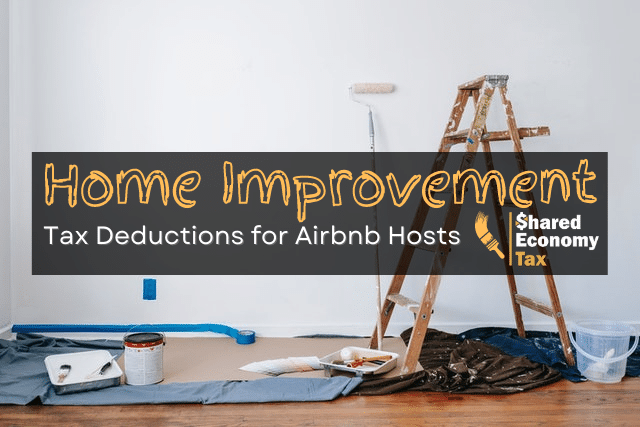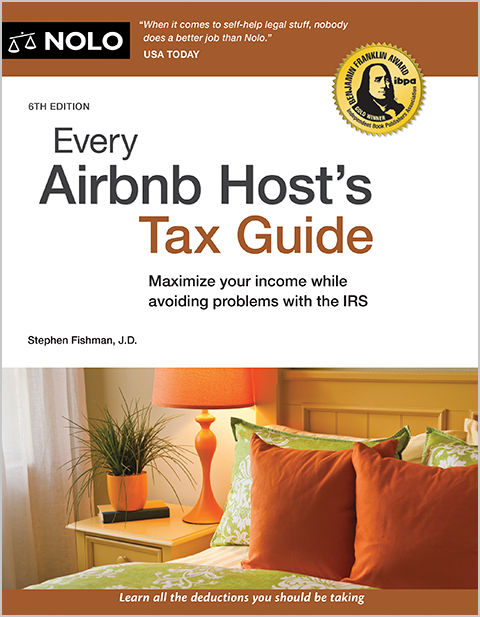As an Airbnb host, you can deduct expenses such as cleaning fees, maintenance, and utilities on your tax return. These deductions can help lower your taxable income and reduce your tax liability.
Operating an Airbnb can be a lucrative venture, but it also comes with tax obligations. Understanding the tax deductions available to Airbnb hosts is crucial for maximizing your savings and minimizing your tax burden. By leveraging deductible expenses like mortgage interest, property taxes, insurance, and depreciation, hosts can optimize their tax situation.
Additionally, expenses related to advertising, professional services, and supplies can also be claimed as deductions. This comprehensive guide will explore the various tax deductions available to Airbnb hosts, empowering them to navigate the tax landscape effectively and capitalize on potential savings.

Credit: sharedeconomycpa.com
Contents
- 1 Introduction To Airbnb Hosting
- 2 Eligibility Criteria For Tax Deductions
- 3 Maximizing Your Deductions: Essential Expenses
- 4 Special Deductions For Airbnb Hosts
- 5 Record-keeping And Documentation
- 6 Navigating The Schedule E Form
- 7 Avoiding Common Pitfalls
- 8 Seeking Professional Help
- 9 Frequently Asked Questions
- 10 Conclusion
Introduction To Airbnb Hosting
The Rise Of Short-term Rentals
Airbnb hosting has become increasingly popular in recent years, with more and more people opening up their homes to travelers. This trend has been driven by the desire for unique travel experiences and the potential for hosts to earn extra income.
Key Financial Considerations
As an Airbnb host, there are several important financial factors to consider. From tax implications to deductible expenses, understanding the financial aspects of hosting can have a significant impact on your bottom line.

Credit: store.nolo.com
Eligibility Criteria For Tax Deductions
Distinguishing Personal And Rental Use
Airbnb hosts must carefully distinguish personal use of their property from rental use to determine the portion eligible for tax deductions.
Irs Rules For Short-term Rentals
The IRS has specific rules for short-term rentals which Airbnb hosts must adhere to in order to qualify for tax deductions.
Maximizing Your Deductions: Essential Expenses
Maximize your deductions as an Airbnb host by claiming essential expenses for tax deductions. Ensure to keep detailed records for maintenance, utilities, and other allowable costs to optimize your tax benefits. Stay informed about tax rules to make the most of your deductions.
As an Airbnb host, it’s important to understand the tax deductions you’re entitled to. By maximizing your deductions, you can reduce your taxable income and save money on your tax bill. In this article, we’ll focus on essential expenses that you can deduct from your Airbnb income.Common Deductible Expenses
There are several common expenses that Airbnb hosts can deduct on their tax returns. These include:- Cleaning and maintenance fees
- Insurance premiums
- Property taxes
- Utilities (electricity, gas, water, etc.)
- Repairs and improvements
- Supplies (toilet paper, soap, etc.)
- Advertising and marketing expenses
- Mortgage interest and property depreciation
Understanding Depreciation
Depreciation is a tax deduction that allows you to deduct the cost of your property over time. As an Airbnb host, you can depreciate the cost of your property (excluding land) over 27.5 years. This means you can deduct a portion of the cost each year on your tax return.For example, if you purchased a property for $275,000, you can deduct $10,000 ($275,000 divided by 27.5) each year for 27.5 years.It’s important to note that depreciation deductions can only be claimed on the portion of the property that’s used for rental purposes. If you rent out a room in your primary residence, you can only depreciate the portion of the property that’s used for rental purposes.In conclusion, understanding the tax deductions available to Airbnb hosts is essential for maximizing your deductions and reducing your taxable income. By keeping accurate records of your expenses and understanding depreciation, you can save money on your tax bill and increase your profits as an Airbnb host.Special Deductions For Airbnb Hosts
Special deductions are available for Airbnb hosts when it comes to tax deductions. These deductions can help hosts save money on expenses related to their Airbnb rental properties, such as cleaning fees, maintenance costs, and insurance premiums. With proper documentation, hosts can take advantage of these deductions and maximize their tax savings.
As an Airbnb host, you are considered self-employed and are responsible for reporting your income and expenses on your tax returns. However, the good news is that there are several tax deductions available to help reduce your tax bill. Here are some special deductions for Airbnb hosts that you should know about.Home Office Expenses
If you use a portion of your home exclusively for Airbnb hosting, you may be able to deduct some of your home office expenses. These expenses could include the cost of utilities, rent, mortgage interest, property taxes, and home insurance. However, you must be able to show that the space is used exclusively for Airbnb hosting and not for personal use.You can calculate the amount of your home office deduction by determining the percentage of your home that is used for Airbnb hosting and then applying that percentage to your eligible home expenses. For example, if your Airbnb space takes up 10% of your home, you can deduct 10% of your home office expenses.Local Taxes And Licenses
As an Airbnb host, you may be required to pay local taxes and obtain necessary licenses to operate legally. The good news is that you can deduct these expenses on your tax return.Local taxes may include occupancy taxes, sales taxes, and other fees charged by your city or county. Licenses may include permits to operate as a short-term rental or a business license. Keep track of these expenses throughout the year, so you can deduct them come tax time.Depreciation
If you own the property you rent out on Airbnb, you may be able to claim depreciation on your tax return. Depreciation is the process of deducting the cost of a long-term asset over its useful life. In the case of a rental property, this would typically be 27.5 years.Depreciation can be a valuable tax deduction, as it allows you to deduct a portion of the cost of your property each year. This can help reduce your taxable income and lower your tax bill.In conclusion, as an Airbnb host, you have access to several special tax deductions that can help reduce your tax bill. Keep track of your expenses throughout the year and consult with a tax professional to ensure that you are taking advantage of all the deductions available to you.Record-keeping And Documentation
Proper record-keeping and documentation are crucial for Airbnb hosts to claim tax deductions. Hosts should maintain a log of all expenses related to their rental property, including repairs, maintenance, and utilities. Keeping receipts and invoices for all expenses can help hosts to claim the maximum deductions allowed by the IRS.
Proper record-keeping and documentation are essential for Airbnb hosts to ensure accurate tax deductions. By maintaining organized financial records, hosts can maximize their deductions and minimize the risk of audit. In this section, we will explore some useful tools and apps for financial tracking as well as the receipts and documents hosts should keep.Tools And Apps For Financial Tracking
To simplify the process of tracking income and expenses, there are various tools and apps available for Airbnb hosts. These tools can help hosts stay organized and ensure they have all the necessary financial information at their fingertips.One popular tool is QuickBooks, which offers a user-friendly interface for managing income, expenses, and invoices. It allows hosts to categorize their transactions and generate reports for tax purposes.Another helpful app is Expensify, which enables hosts to track expenses by scanning receipts and automatically extracting relevant information. This eliminates the need for manual data entry and saves valuable time.For hosts who prefer mobile apps, MileIQ is a great option. It automatically tracks and logs mileage for business-related trips, making it easier to claim deductions for transportation expenses.What Receipts To Keep
Keeping detailed records of expenses is crucial for Airbnb hosts to substantiate their deductions. Hosts should retain receipts for all business-related expenses, including:- Property-related expenses such as mortgage interest, property taxes, insurance, and repairs
- Utilities like electricity, water, and internet
- Cleaning and maintenance costs
- Supplies and amenities provided to guests
- Advertising and marketing expenses
- Professional services like legal and accounting fees
- Travel and transportation expenses
In Conclusion
Maintaining proper record-keeping and documentation is vital for Airbnb hosts to take advantage of tax deductions. Utilizing tools and apps for financial tracking can streamline the process, while keeping receipts for all business-related expenses ensures hosts have the necessary documentation. By prioritizing record-keeping, hosts can maximize their deductions and maintain compliance with tax regulations.:max_bytes(150000):strip_icc()/Profitable_AirbnbHosting_GettyImages-932778742-657e0f7ae3204baba95e804c4dcb6292.jpg)
Credit: www.thebalancemoney.com
Navigate the Schedule E Form with ease and make the most of your tax deductions as an Airbnb host. Keep track of expenses such as cleaning, repairs, and supplies, and ensure accurate reporting to maximize your savings.
Reporting Rental Income
When reporting rental income on Schedule E, clearly state the total rental income received.
Include income from Airbnb reservations, cleaning fees, and any other related income.
Be sure to accurately document the income for each rental property separately.
Filling Out Expenses Section
Itemize all expenses related to hosting on Airbnb on Schedule E.
Include costs for maintenance, repairs, utilities, insurance, and supplies.
Ensure proper documentation and receipts for all expenses claimed.
Categorize expenses accordingly to make the process easier.
When completing your taxes as an Airbnb host, the Schedule E form is a crucial document. It is where you will report your rental income and deductible expenses. Understanding how to navigate this form correctly is essential to ensure accurate reporting and maximize your tax deductions.
Avoiding Common Pitfalls
Avoiding common pitfalls when claiming tax deductions as an Airbnb host is crucial. Ensuring accurate record-keeping and understanding the specific deductible expenses can help hosts avoid potential issues with the IRS. Additionally, seeking professional tax advice can provide valuable guidance in maximizing deductions while staying compliant with tax regulations.
Misclassifying Properties
Ensure you correctly classify your property for tax purposes to avoid penalties.
Overlooking Eligible Deductions
Review all possible deductions to maximize your tax savings as an Airbnb host.
Seeking Professional Help
For Airbnb hosts, seeking professional help for understanding tax deductions is crucial. Professional guidance can ensure that hosts maximize their deductions while complying with tax regulations. With the complexity of tax rules, enlisting the expertise of a professional can provide peace of mind and potentially save money in the long run.
When To Hire A Tax Advisor
Consider hiring a tax advisor when your Airbnb income is substantial.
Seek professional help if you are unsure about tax laws.
Benefits Of Professional Financial Planning
Professional planning ensures accurate deductions and compliance.
Financial advisors help optimize tax savings and avoid penalties.
Frequently Asked Questions
What Can Airbnb Hosts Write Off On Taxes?
Airbnb hosts can write off expenses such as cleaning fees, supplies, utilities, insurance, and maintenance costs on their taxes. These deductions can help reduce the overall taxable income from their Airbnb rental.
Can You Write Off Utilities For An Airbnb?
Yes, you can write off utilities for an Airbnb. Utilities expenses like electricity, water, gas, internet, and other necessary services can be deducted as business expenses on your tax return. Ensure to keep proper records and consult a tax professional for accurate advice.
Can I Write Off Furniture For Airbnb?
Yes, you can write off furniture for your Airbnb as a business expense on your taxes.
How Does Irs Treat Airbnb Income?
The IRS treats Airbnb income as taxable rental income. It should be reported on your tax return.
Conclusion
Tax deductions can be a significant benefit for Airbnb hosts. By taking advantage of deductions such as mortgage interest, cleaning expenses, and property management fees, hosts can reduce their taxable income and potentially save money. It is important for hosts to keep detailed records and consult with a tax professional to ensure compliance with tax laws and maximize deductions.
With careful planning and documentation, Airbnb hosting can be a profitable venture with tax advantages.


